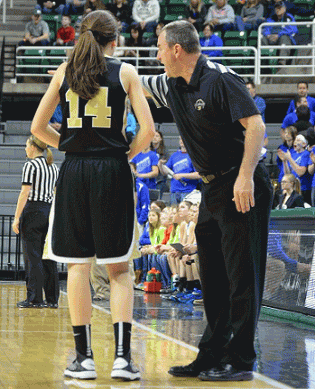Basketball Coaching - Having Hands-On Players
by Anthony B. Lanzillo
From the Coach’s Clipboard Basketball Playbook"Helping coaches coach better..."
Tone Lanzillo is a mental prep coach to athletes who want to be mentally prepared to play their best game. He has worked with student-athletes, from middle school through high school and into college, in such sports as basketball, football, soccer and lacrosse. Over the past several years, he has written for a number of sports blogs and websites, including FirstDown Playbook, Coaches Training Room, Ultimate Hockey Source, and Lax Playbook.
Contact: Anthony B. Lanzillo
"Your thought process must be simplified and concerned only with what is happening now to win or reach your peak performance in sports. Always stay fully focused in the moment on the field of play. Thoughts about the past and future are fog, and thoughts about the present - the here and now - are clear skies." - Jim Afremow - The Champion's Mind
"You have to be in the moment. You can't worry about what just happened. The basket you missed, the foul you made two minutes ago, because it's over. You can't worry about what's gonna happen the next time down the floor. You have to be right there in the moment... You have to be here right now to play basketball when it's happening." - (quote by Chicago Bull's player Bill Wellington) Roland Lazenby - Mindgames
A good basketball team must have hands-on players. These are players who know how to make here and now decisions on the court. It's not only about keeping their focus or attention in the here and now, but just as importantly, making the right decision for their team in that moment. Hands-on players know how to play with a presence of mind, poise, a sense of purpose and the right perspective.
In her book, Athlete-Centred Coaching, Lynn Kidman stated "...informed decisions by athletes are essential to performance success". So, in coaching your players, you want to show them how to play hands-on basketball, and thereby, are able to get the information they need to make the best decisions in any moment of a game. You want your players to make smart split-second decisions that put themselves and the team in the best position to succeed and win.
First, you want to talk to your players about playing with their eyes. They have to clearly see what is happening in the moment if they want to make the right decision. There is the player who is bringing the ball down the court to set up his team for an offensive play and is replaying a mistake he made in the first half of the game.
Or you have a player on defense who is trying to guard an opposing player and is worried about being outplayed again. These two players are playing with their feelings and fears, which are triggered by events in the past or future, and therefore, are not able to play with their eyes. And since they aren't playing with their eyes, they can't clearly see what's happening right in front of them.

There are some players whose thoughts are bouncing back and forth between something that happened five minutes ago and wondering how the game will end. For these players, they can't concentrate or focus on the here and how, and in fact, will feel as if the game is speeding up and that they are losing control of themselves. And, they will begin feeling drained - mentally and emotionally.
Third, you want to talk to your players about playing under control. They should be able to identify all the different elements of a game that they don't control. Whether it's the refs calls, the athletic skills of the opposing team's players, comments from the sidelines or stands, or one of their best teammates who gets injured, there are various elements of the game that are not relevant to how your players perform on the court.
Each of your players must remind himself, probably on a regular basis, that the only thing that he can control is his own thoughts and behaviors. Therefore, if the player wants to play hands-on ball, then he needs to keep his primary focus on what he is thinking and doing in the here and now.
Fourth, you want to talk to your players about playing on purpose. They must know the goal or intention of every step or move that they make on the court. The clearer they are about what they are doing in the moment gives them a better opportunity to make the best decisions in that moment. For a point guard on offense, playing on purpose may mean keep moving the ball until he finds the open man.
For a forward on defense, playing on purpose means grabbing the ball off the backboard and starting the transition down the court. When your players are playing on purpose, they will be looking for the information or opportunities to support that purpose. If a player doesn't know what to do and isn't playing on purpose, then he is more likely to be thinking and worrying about what he doesn't want to happen. This only leads to more stress, anxiety and ultimately bad decisions.
Related pages: